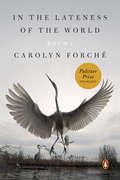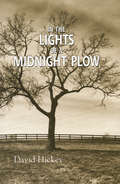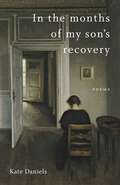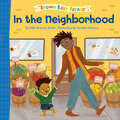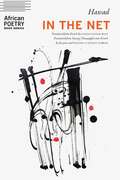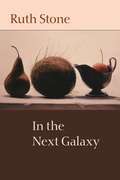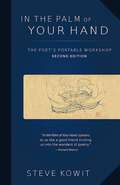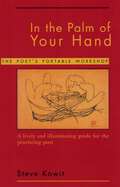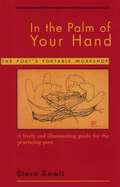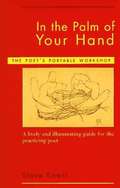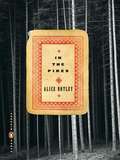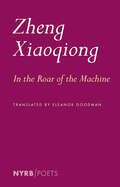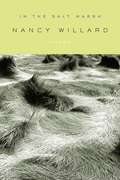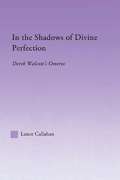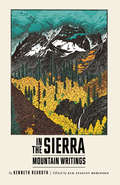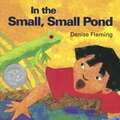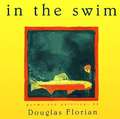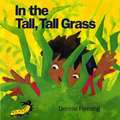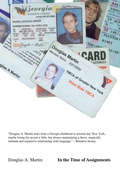- Table View
- List View
In the Lateness of the World: Poems
by Carolyn Forché&“An undisputed literary event.&” — NPRA new poetry collection of uncanny grace and moral force from one of our country's most celebrated poetsOver four decades, Carolyn Forché's visionary work has reinvigorated poetry's power to awaken the reader. Her groundbreaking poems have been testimonies, inquiries, and wonderments. They daringly map a territory where poetry asserts our inexhaustible responsibility to each other. Her first new collection in seventeen years, In the Lateness of the World is a tenebrous book of crossings, of migrations across oceans and borders but also between the present and the past, life and death. The poems call to the reader from the end of the world where they are sifting through the aftermath of history. Forché envisions a place where "you could see everything at once ... every moment you have lived or place you have been." The world here seems to be steadily vanishing, but in the moments before the uncertain end, an illumination arrives and "there is nothing that cannot be seen." In the Lateness of the World is a revelation from one of the finest poets writing today.
In the Lights of a Midnight Plow
by David HickeyIn the Lights of a Midnight Plow, glitters and startles. The writing is deftly musical, where every detail and image has been carefully weighed, honed with a knife's edge and poet's ear. There is language, the sparkle and sheen of it, the rhythm, all of which tells us that a new and important voice is at work here.
In the Months of My Son's Recovery: Poems (Southern Messenger Poets)
by Kate DanielsThe poems of In the Months of My Son’s Recovery inhabit the voice and point of view of the mother of a heroin addict who enters recovery. With clear perception and precise emotional tones, Kate Daniels explores recovery experiences from multiple, evolving vantage points, including active addiction, 12-step treatment, co-occurring mental illness and addiction (known as dual diagnosis), and relapse. These intimately voiced, harrowing poems reveal the collateral damage that addiction inflicts on friends and families, in addition to the primary damage sustained by addicts themselves. Offering bold descriptions of medical processes, maternal love, and the potential for hope as an antidote to despair, this timely collection offers a firsthand account of the many crises at the heart of the opioid epidemic.
In the Name of Salome
by Julia AlvarezTold from two points of view, this novel is the story of Salome Urefia, the national poet of the Dominican Republic, and of her daughter Camila, who becomes a professor at Vassar College. The narrative shifts between their storylines and viewpoints. This is a beautifully written book with compelling characters and a vivid sense of history.
In the Neighborhood: A Brown Baby Parade Book (Brown Baby Parade)
by Nikki Shannon SmithBaby and Daddy are taking a walk in their neighborhood! Read along as they say hello to their friends and celebrate their community in this next installment of the Brown Baby Parade series that's perfect for ages 0-3.Baby&’s home with Daddy.He wants to take a walk.They have friendly neighbors,who like to wave and talk.The neighborhood is bustling with friends who are planting, playing baseball, blowing bubbles, and more! Read along as Baby and Daddy say hi to them all!Nikki Shannon Smith's soothing, rhythmic text and Tamisha Anthony's warm, welcoming illustrations pair beautifully to create heartwarming scenes of everyday life. The joyful depiction of a diverse community will allow children to see themselves and encourage them to interact with their own neighborhood!
In the Net (African Poetry Book)
by Mahmoudan HawadIn the face of amnesia, how does one exist? In this poem, Hawad speaks directly to Azawad, a silent figure whose name designates a portion of Tuareg lands divided among five nation-states created in the 1960s. This evanescent being, situated on the edge of the abyss and deprived of speech, space, and the right to exist, has reached such a stage of suffering, misery, and oppression that it acquiesces to the erasure implicit in the labels attached to it. Through an avalanche of words, sounds, and gestures, Hawad attempts to free this creature from the net that ensnares it, to patch together a silhouette that is capable of standing up again, to transform pain into a breeding ground for resistance—a resistance requiring a return to the self, the imagination, and ways of thinking about the world differently. The road will be long. Hawad uses poetry, &“cartridges of old words, / a thousand and one misfires, botched, reloaded,&” as a weapon of resistance.
In the Next Galaxy
by Ruth StoneRuth Stone writes with crackling intelligence from the vantage point of an aging and impoverished woman. Wise, sardonic, crafty, and misleadingly simple, Stone loves heavy themes but loathes heavy poems.<P><P> Winner of the National Book Award
In the Palm of Your Hand, Second Edition: A Poet's Portable Workshop
by Steve Kowit*Over 90,000 copies sold* Long an anchor text for college and junior college writing classes, this illuminating and invaluable guide has become a favorite for beginning poets and an ever-valuable reference for more advanced students who want to sharpen their craft, expand their technical skills, and engage their deepest memories and concerns.This edition adds Steve Kowit’s famous essay on poetics “The Mystique of the Difficult Poem,” in which he argues stirringly and forcefully that a poem need not be obscure to be great. Ideal for teachers who have been searching for a way to inspire students with a love for writing--and reading--contemporary poetry. It is a book about shaping your memories and passions, your pleasures, obsessions, dreams, secrets, and sorrows into the poems you have always wanted to write. If you long to create poetry that is magical and moving, this is the book you've been looking for. Here are chapters on the language and music of poetry, the art of revision, traditional and experimental techniques, and how to get your poetry started, perfected, and published. Not the least of the book's pleasures are model poems by many of the best contemporary poets, illuminating craft discussions, and the author's detailed suggestions for writing dozens of poems about your deepest and most passionate concerns.
In the Palm of Your Hand: A Poet's Portable Workshop
by Steve KowitAn illuminating and invaluable guide for beginners wary of modern poetry, as well as for more advanced students who want to sharpen their craft and write poems that expand their technical skills, excite their imaginations, and engage their deepest memories and concerns. Ideal for teachers who have been searching for a way to inspire students with a love for writing--and reading--contemporary poetry. It is a book about shaping your memories and passions, your pleasures, obsessions, dreams, secrets, and sorrows into the poems you have always wanted to write. If you long to create poetry that is magical and moving, this is the book you've been looking for. Here are chapters on the language and music of poetry, the art of revision, traditional and experimental techniques, and how to get your poetry started, perfected, and published. Not the least of the book's pleasures are model poems by many of the best contemporary poets, illuminating craft discussions, and the author's detailed suggestions for writing dozens of poems about your deepest and most passionate concerns.
In the Palm of Your Hand: A Poet's Portable Workshop
by Steve KowitIdeal for teachers who have been searching for a way to inspire students with a love for writing--and reading--contemporary poetry.It is a book about shaping your memories and passions, your pleasures, obsessions, dreams, secrets, and sorrows into the poems you have always wanted to write. If you long to create poetry that is magical and moving, this is the book you've been looking for.Here are chapters on the language and music of poetry, the art of revision, traditional and experimental techniques, and how to get your poetry started, perfected, and published. Not the least of the book's pleasures are model poems by many of the best contemporary poets, illuminating craft discussions, and the author's detailed suggestions for writing dozens of poems about your deepest and most passionate concerns.
In the Palm of Your Hand: A Poet's Portable Workshop
by Steve KowitIdeal for teachers who have been searching for a way to inspire students with a love for writing--and reading--contemporary poetry.It is a book about shaping your memories and passions, your pleasures, obsessions, dreams, secrets, and sorrows into the poems you have always wanted to write. If you long to create poetry that is magical and moving, this is the book you've been looking for.Here are chapters on the language and music of poetry, the art of revision, traditional and experimental techniques, and how to get your poetry started, perfected, and published. Not the least of the book's pleasures are model poems by many of the best contemporary poets, illuminating craft discussions, and the author's detailed suggestions for writing dozens of poems about your deepest and most passionate concerns.
In the Pines
by Alice NotleyA bold and strikingly original new work from one of America's greatest living poets Alice Notley is considered by many to be among the most outstanding of living American poets. Notley's work has always been highly narrative, and her new book mixes short lyrics with long, expansive lines of poetry that often take the form of prose sentences, in an effort "to change writing completely. " The title piece, a folksong-like lament, makes a unified tale out of many stories of many people; the middle section, "The Black Trailor," is a compilation of noir fictions and reflections; while the shorter poems of "Hemostatic" range from tough lyrics to sung dramas. Full of curative power, music, and the possibility of transformation, In the Pines is a genre- bending book from one of our most innovative writers. .
In the Pines
by Alice NotleyA bold and strikingly original new work from one of America's greatest living poets Alice Notley is considered by many to be among the most outstanding of living American poets. Notley's work has always been highly narrative, and her new book mixes short lyrics with long, expansive lines of poetry that often take the form of prose sentences, in an effort "to change writing completely." The title piece, a folksong-like lament, makes a unified tale out of many stories of many people; the middle section, "The Black Trailor," is a compilation of noir fictions and reflections; while the shorter poems of "Hemostatic" range from tough lyrics to sung dramas. Full of curative power, music, and the possibility of transformation, In the Pines is a genre- bending book from one of our most innovative writers.
In the Presence of the Sun: Stories and Poems
by N. Scott MomadayThe author's stories and poems that represent the American heritages and cultures of the past.
In the Roar of the Machine
by Zheng XiaoqiongPoems about life in the Chinese factories by a brilliant and passionate poet and workers&’ rights activist. This collection shines light on the human toll behind the production of cheap goods, all set in the context of classical Chinese literature, the natural environment of southern China, and the voices of the poet's own ancestors.Zheng Xiaoqiong is one of the most significant living Chinese poets whose unique poetics brings to the fore the plight of factory workers, women, and the rural poor in contemporary China, while situating these sociological concerns within a larger context that includes classical Chinese poetry, the voices of Zheng&’s ancestors, the natural environment of southern China, and her native Huangma Mountains in central Sichuan.Zheng spent nearly a decade working in the factories and warehouses of Guangdong province, one of the largest manufacturing centers in the world. Her poems give voice to the global economy&’s human toll: the twelve-hour days on the assembly line, the endless mechanical din, the injuries and drudgery, the homesick murmur of far-flung dialects in the dorms.Zheng is an advocate for worker&’s and women&’s rights, but what counters the roar of the machines in her poetry is the tenderness of her attention: &“we / live, the nearby crowds that come and go / they live in my poetry, on paper, immense / yet frail, the tiny voices of these sentences / these fragile hearts.&”
In the Salt Marsh: Poems
by Nancy WillardIn this strong, appealing collection, Nancy Willard shares her passion for observing the mysteries of the natural world, particularly the flora and fauna of Cape Cod and the Hudson Valley, where many of these poems are set. We see, through her eyes, the coming of darkness to an empty orchard, the retreat of deer at dusk, and the breakup of a river with the onset of spring. Willard is also deeply engaged with the living creatures that populate her world. Her poems record her encounter with a moon snail and her celebration of the ladybugs she sends into the garden and the butterflies that alight on her shoulders like ghostly kisses. Amid poems about the intimate presence of nature are expressions of absences deeply felt. Willard is drawn not just to the inhabited world but also to the empty spaces with which our passage through life is strewn. In “The Absence at the Swing,” a rabbit watches a swing’s back-and-forth motion just after the children have left the playground; in “Niche Without Statue,” she takes us to “an alcove scoured / to stucco light” and tells us, “Somebody lived here. Stepped away. No tracks. ” We learn, too, of the presences she misses most deeply, as in “Phone Poem,” in which she imagines receiving a telephone call from her father after his death. Whether she is cultivating a sense of the life that is all around her or attending to the losses felt within, Nancy Willard never ceases to enchant us with the sense of dedication and awe that graces her verse. From the Hardcover edition.
In the Shadows of Divine Perfection: Derek Walcott's Omeros (Studies in Major Literary Authors #30)
by Lance CallahanIn the Shadows of Divine Perfection provides an examination of Derek Walcott's Omeros 1990)- the St. Lucian poet's longest work, and the piece that secured his Nobel Laureate-that reveals the deep-seated bond between the root narratives of ancient Greece to the cultural products and practices of the contemporary Caribbean. This book presents the first detailed reading of Walcott's highly controversial attempt to craft a Caribbean master narrative. This book also presents an overview of the poem's ideological orientation and a far-reaching critique of current postcolonial theory. Lance Callahan engages some of the most vexing problems of authenticity by reading Walcott's work alongside ancient Greek literature and culture.
In the Sierra: Mountain Writings
by Kim Stanley Robinson Kenneth RexrothNature writings by one of America's greatest poets, written out of a deep experience of the Sierras. Over the course of his life, Kenneth Rexroth wrote about the Sierra Nevada better than anyone. Progressive in terms of environmental ethics and comparable to the writings of Emerson, Thoreau, Aldo Leopard, Annie Dillard, and Gary Snyder, Rexroth's poetry and prose described the way Californians have always experienced and loved the High Sierra. Contained in this marvelous collection are transcendent nature poems, as well as prose selections from his memoir An Autobiographical Novel, newspaper columns, published and unpublished WPA guidebooks, and correspondence. Famed science-fiction writer Kim Stanley Robinson has compiled a gift for lovers of mountains and poetry both. This volume also contains Robinson's introduction and notes, photographs of Rexroth, a map of Rexroth's travels, and an amazing astronomical analysis of Rexroth's poems by the fiction writer Carter Scholz.
In the Small Small Pond
by Denise FlemingIllustrations and rhyming text describe the activities of animals living in and near a small pond as spring progresses to autumn.
In the Swim: Poems and Paintings
by Douglas FlorianChildren will delight in the playful, witty language of twenty-one lively poems while they learn about their ocean and freshwater friends. From toothy piranhas and regal rays to itty-bitty tetras and somersaulting salmon, here is an aquarium full of fun for readers--and swimmers--of all ages. "This one, like the rainbow trout on the penultimate page, is definitely 'Divine!/Delish!'"--School Library Journal
In the Tall, Tall Grass
by Denise FlemingIf you were a fuzzy caterpillar crawling through the tall, tall grass on a sunny afternoon, what would you see? Beginning as the sun is high in the sky and ending as fireflies blink and the moon rises above, this backyard tour is one no child will want to miss.
In the Time of Assignments
by Douglas A. MartinIn the Time of Assignments transforms a decade’s worth of feeling into a lyrical collection of verse. Readers familiar with Martin’s work will find a repurposing and revelation of the foundations for his prior experiments in prose. The work is divided into three parts, each with a geographical marker indicating the narrator’s evolving identity, from the formative, Red State landscape that colors the first section through the widening horizons, growing sexual awareness, and crush of experience found in the final two. The beautifully fragmentary narrative exhibited in Martin’s novels takes hold here in long, poetic sequences and angled interludes; lyric is the steady underpinning.
In the Trail of the Wind: American Indian Poems and Ritual Orations
by John BierhorstA collection of songs, prayers, chants, dreams and orations from tribes in North and South America.
Inanna: Queen of Heaven and Earth
by Diane Wolkstein Samuel Noah KramerStories and hymns to Inanna and some history of the land which is now part of Iraq.
